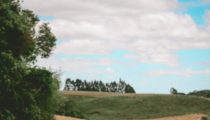“And there was a woman who had had a discharge…
This Must Be the Place
The clouds overhanging the horizon are the color of coal, and beyond that clot of shadows William can see veins of coursing light–but he spares them no thought. For now there is only the pale sky above and the highway like dark and yellow-lined water passing beneath the old convertible as whips of wind lash joyous against the car, urging it on, sweeping across William’s hair and bringing a boy’s smile to his tired face until the day’s labor of grey seams and shovels vanishes behind him and all that remains is the familiar animal ache of his bones and a longing like a question that only Eleanor can answer. Soon this day will die yet here and now the sun is a golden void, a molten clockface emptied of all markings, and William hollers and laughs, his voice hoarse as he moves parallel these fields where the air is spiced of summer and the birds nest in the amen of sumac and the cows graze and eye him with quiet regard, and everywhere that he looks along the almighty landscape he finds a home, the world itself the greatest among them, a home to the black bears roving the mountain creek beds and the silver trout fated for their maws and the soft-footed foxes that rustle through blooms of pink and red in rhododendron romances. The car is rounding a bend, ascending the hill, and far beyond the curve of a wooden railing the ridgeline is blazed with mountain laurel and azaleas and trees with bloodbright leaves that hint of autumn’s coming. William’s fingers, nails streaked black, touch the radio dial and turn it until they find a song, its melody timeless, its four chords moving like the calm coupling of lifelong lovers, and though he cannot recall the lyrics he hums that perfect melody and makes up words all his own. An earnest rain is falling when he rolls into the driveway, so he jumps from the car to pull down the ragtop and then jogs for the cover of the porch where Eleanor awaits him, a red kerchief in her hair and dirt at her cheek, and they kiss and she slips the straps of his overalls away and he likewise with her dress and they bring their bodies together like lips to honeysuckle and once they are filled with that cathedral emptiness she says that she has something more to show him. William follows her through the house and then the creaking back door, and below lay four naked garden beds bridged by paths of flat stones, and he sees this space as it is and will be, drenched in color and living light and fragrance, and he marvels at this quiet glory and runs his thumb along the rim of Eleanor’s ear with a broad grin on his face, glad to love this woman of strength, cherishing this rain that would nourish all things, even those in the black beneath the ground. William walks down into the yard, and when his feet touch the earth shivers run across his body, and he remembers his grandfather saying that this happens when someone walks over your grave, so William regards the sweep of rain-bowed grass and thinks this must be the place, this must be the place, as if the sky would split above with a bolt for his heart. But it is not yet his time to die, not now, when a lone robin alights on the far fence and Eleanor’s legs bead with raindrops and the boards of the garden beds are painted blue like the eyes of the daughter that William will know for too few years and yet love enough for a lifetime, this man who has breathed in the whole of the world, letting the clouds themselves into his lungs, this man less a man than a lightning rod.

